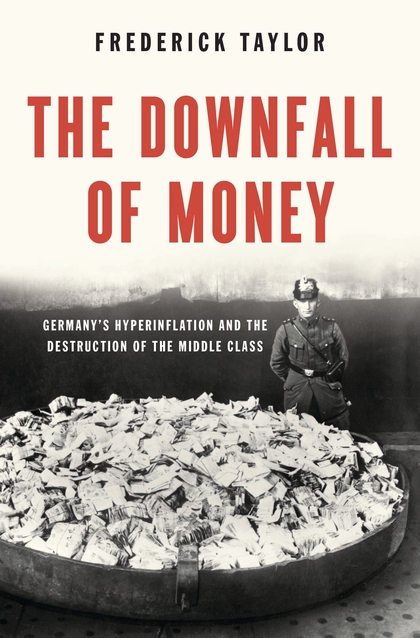Competition: follow @inflationsurvey on Twitter to have a chance to win one of 15 copies of The Downfall of Money by Frederick Taylor
At the end of October, the Citigroup Inflation Expectations survey showed a record jump in UK inflation expectations. The medium term expectation for UK inflation rose from 3.3% in September to 3.9%, and the number of people expecting inflation over 5% also rose significantly. Inflation expectations have become increasingly important in the UK because, as part of Bank Governor Carney’s new forward guidance regime announced in August, the Bank can raise rates even if unemployment remains high if inflation expectations become “unanchored”. Of course the period when the Citigroup survey was conducted was one where the major UK energy suppliers had announced annual price hikes of around 10%, and this spike in inflation expectations may well not persist. But it will have worried the Bank, and the gilt market fell on the release of the data.
Whilst UK inflation was making the news for its potential to surprise on the upside, Europe faced a very different scenario. October’s euro area CPI reading came in at an annual rate of 0.7%, down from 1.1% in September and below the market’s expectations. A Taylor Rule would suggest that with inflation so far from the ECB’s target of 2%, the central bank should be aggressively easing monetary policy (beyond today’s 25 bps cut, and beyond the zero bound to include QE?).
The next M&G YouGov Inflation Expectations Survey for the UK, European and Asian economies will be released in December. These M&G YouGov surveys are based on the best practice methodology discussed by the New York Fed (for example asking people about inflation rather than “prices of things you buy” as that sort of question tends to make people think solely of milk, bread and beer). We also have a bigger data sample than many of the other inflation surveys. Finally we also ask some interesting supplementary questions on issues like government economic policy credibility. As inflation expectations become increasingly important to central banks we think that we need to pay more attention to them – to date they have been well anchored, despite money printing through QE, but if this changes then so will central bank behaviour.
The Q4 M&G YouGov Inflation Expectations Survey will be released through Twitter. Follow @inflationsurvey to get the release time and date, and also to access the detailed report in December. The feed will also tweet on other inflation surveys and measures of inflation expectations. We hope you find it useful.
To encourage you to follow @inflationsurvey and be first to get the survey results, everybody who does so (and existing followers) will be put into a draw to win one of 15 copies of Frederick Taylor’s The Downfall of Money. This is the story of Germany’s hyperinflation of the 1920s, where the Reichsmark fell to 2.5 trillion to the US dollar, and the economy collapsed – arguably sowing the seeds of the Second World War.

The value of investments will fluctuate, which will cause prices to fall as well as rise and you may not get back the original amount you invested. Past performance is not a guide to future performance.


18 years of comment
Discover historical blogs from our extensive archive with our Blast from the past feature. View the most popular blogs posted this month - 5, 10 or 15 years ago!


Bond Vigilantes
Get Bond Vigilantes updates straight to your inbox





